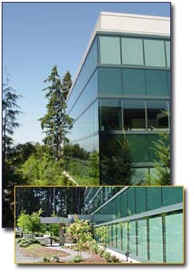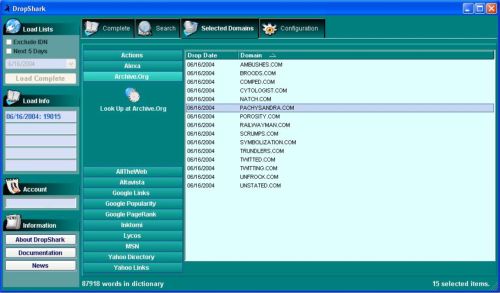

![]()

| Inside a Drop Catcher’s War Room: How eNom Arms Maker Chris Ambler Is Turning The Tide for Club Drop | |||||||||||||||
By Ron
Jackson
|
Chris Ambler |
||||||||||||||
|
Just
as real world warfare spawned legendary generals like George
Patton
and Douglas MacArthur,
drop catching combat is producing its own brand of heroes. The best
of that breed may well be a self-described nerd named Christopher
Ambler
who authored new software for eNom
that has turned that company’s Club
Drop
into a contender almost overnight. Ambler and eNom are drawing a
bead on the reigning expired names leader, a crack panzer division
from Canada
called Pool.com. Less
than a year after they entered the fray, Pool swept away the
previous drop catching kings with a fearsome onslaught fueled by the
enlistment of dozens of registrar allies. Pool still has eNom
outnumbered, but Ambler believes this is the kind of fight where
brains can overcome brawn. Before
rising to prominence in this industry Ambler’s combat experience
had been limited to fighting the suffocating smog and heat in the Los
Angeles
suburbs where he grew up. When it came time to go to college he
planned to tough it out close to home at the University
of California Riverside
branch east of L.A. However after one year there he decided it was
time to throw in the soaked towel and seek a cooler climate. At this
same time in the early 80’s he had discovered an esoteric new
communications medium called the Internet.
Much to Ambler’s delight he found a place just a few hours away where he could cultivate his interest in computers and live in a more hospitable climate. That was San Luis Obispo, a picturesque college town on California’s mountainous central coast, halfway between L.A. and San Francisco. SLO happened to be the home of a top notch computer science school, Cal Poly. Ambler enrolled and wound up spending the next ten years of his life there. He spent some time developing computer applications then started his own company, Image Online Design in 1995. That year would prove to a turning point in his life and not just because of the new business. At the time, Ambler was sharing a house with three other roommates that was known as “The Inferno”. One summer afternoon, he was reading the local Usenet groups for Cal Poly and came across a post from a “Lisa” who said that she was bored and wanted to meet some new people.
Though
Lisa had Chris’ head spinning like Linda Blair in The
Exorcist, he somehow managed to come up with an idea at
Image Online Design in 1995 that would make his first big mark on
the internet community. “I was writing a check for $3,000
to Network Solutions for 30 domain names (in those days, it
was $100 each for 2 years) and I thought, “Wait a minute,
this is silly – I can run a zone server just as easy as NSI
can!” Ambler recalled. "So
I got on the horn with Jon Postel (a famed internet pioneer
involved with the original DNS system who passed away in
1998) and said, “Look, can I get a delegation for .Web
please? I’d like to compete.” Ambler was one of the first
to envision a need for new namespace on the net (years before .com
would reach the saturation point). He pursued his .web
extension dream though a maze of acronyms - informal discussion on
the Newdom mailing list that became the IAHC which led
to CORE’s attempted takeover that turned into the IFWP
which finally morphed into ICANN! After
ICANN’s November 2000 selection process in which .Web was almost
given to Afilias (current operator of the .info
registry), Ambler was relieved to hear Vint Cerf (viewed by
many as the father of the internet) say that he felt that IOD’s
pioneering work should mean that if IOD didn’t get .Web, nobody
should. Ambler
told us, “today there are some 40 new extension applicants from
2000 that are still pending (ICANN made it clear that those not
selected in 2000 were not turned-down, but were just not approved at
that time). My
understanding is that ICANN is working on a process (for
consideration of new TLD’s), as the Department of Commerce has
required them to have one implemented by the end of this year. I
think it’s safe to say that our .Web application is still pending
and we’re first in line once ICANN resumes the process. IOD is
absolutely ready to move forward with .Web,” he added. With
.Web in limbo, a new wife coming on board and IOD in a holding
pattern while ICANN dithered, Ambler came to the conclusion he had
better get a real job. “I
put my resume out there and started a nice tour of the U.S. going on
interviews. After a few months I was about to consider an offer from
the interactive division of Disney when I got a call from Microsoft,”
Ambler said. “They
asked if I could make a 3pm flight that day! I asked my fiancé if I
should go and she gave me a look and said, “Duh?!” So
Ambler flew north, had two days of interviews with a number of
different groups then headed back home. When
he arrived back in San Luis a message was waiting from Microsoft.
“I returned the call and they made a good offer, so after the
wedding, we moved to Seattle and I spent 3 years with
them.” As it turned out Lisa also received a full-time offer from
Microsoft and they decided the ideal situation would be for her to
take the job and have Chris open a consulting business. That arrangement worked well and even allowed Chris to write a book. “I have the dubious distinction of being the author of the very last book (The IIS 6.0 Programming Handbook) that Wrox Press published before going bankrupt," Ambler said. Presumably his book had nothing to do with them going broke!
That
looked like a tall order in early 2003. Club Drop was among several also-rans
trailing far behind one industry leader. Amber recalled, “At
the time, the only other real player was Snapnames, and they
had a decent number of registrars working for them versus eNom’s
single credential. So my work was cut out for me in creating
software that could compete in that environment.” What
a difference a year can make in this business. Today Ambler’s
software is running at eNom with 27 registrar partners, and
is competing head-to-head with Pool’s 60-65 registrars (a number
that seems to increase on a daily basis). Despite Pool’s edge in
numbers, Ambler told us
“we’re now getting about 50% of the value-names that
we’re going for with our 27 registrars.” The
actual drop process and the exact role played by software has always
been a mystery to most people. Only a handful have the inside
knowledge Ambler has, so naturally we asked him to share it with us!
Of course much of what he knows is proprietary and there are still
some secrets even he doesn’t know. “There
are aspects of the process that I don’t know - and nobody
knows except Verisign!," Ambler said. “Verisign keeps
a lot of the technical information very well hidden and 90% of the
fun in writing Club Drop was attempting to determine exactly
what’s going on based only on what I could see at my end. It’s
true black-box testing! There was a lot of trial and error when we
first started, and some of the results were hard to interpret and,
of course, Verisign was no help because whenever I’d call and ask
a question they’d politely decline to answer!” OK,
we could believe that, but we weren’t about to let Ambler off that
easy. If he didn’t throw us a bone we warned him that this story
could take a nasty turn for the worse! That seemed to do the trick
and he walked us through the whole process, from the basics most are
familiar with to the finer points privy only to insiders.
“In
a nutshell, at 2pm Eastern time (11am my time), Verisign
starts changing the status of the list of pending-delete names for
that day from pending-delete to available. They do this over the
course of an hour or so - a little more or a little less depending
on how many names are dropping that day. When this happens, the
drop-catching software run by Club Drop or Pool or Snapnames (or
whomever) starts pounding Verisign with requests for the name.” Ambler
said, “The real magic comes in flooding VeriSign with those
commands absolutely as fast as you can and, of course, in having as
many registrars as possible doing it on your behalf. Verisign limits
the number of connections and the amount of bandwidth each registrar
gets, so there are a finite number of commands you can bring to bear
during the drop. Each registrar that you have working for you
increases the number of commands you can send, increasing your
chances of getting the domain.” “It
is the world’s most regular denial-of-service attack,” Ambler
said. “In a perfect world, it would be a simple issue of
probability. For example, if I had 1 registrar working for me who
could do 20 commands, and you had two registrars working for you who
could do 15 commands each, you would have a 3/5ths chance of getting
a name, and I would have 2/5ths. In percentages, you would have a
60% chance for any given name vs. my 40% chance. As it turns out,
it’s not that simple, because (and I’m going to be deliberately
vague here), there are things you can do to make your commands more
effective once they get to Verisign. So yes, how hard you can
slam the heck out of the registry is important, but there’s more
to it than that.” Ambler
added, “the problem in answering this question in depth is that
there are a lot of aspects of the drop that I’ve come to
understand in the past year or so that may or may not be
proprietary. I say “may or may not” simply because it’s hard
to know what our competition knows. I may presume, for example, that
everyone knows that you have to do something in a particular way,
only to find out I was the only one who knew that. Or that I was
completely wrong!” This
may be a topic only domainers are passionate about, but if someone
wrote a tell-all book about it, they would probably get a 100%
sell-through rate in this industry. If such a book hits the market,
odds are Ambler’s name will be on it. “I am working on notes
right now for a book about the drop. I’m going to write about how
I went about figuring out what was going on, what I thought the
competition was doing, and what I thought Verisign was doing.” Ambler
believes the day is coming when all of the secrets will be
revealed. “One of these days the drop will be gone. Not WLS,
I think, but something new. At that point I’m going to contact
Verisign and ask them how they really ran things on their end. I’m
going to talk to the guys at Snapnames, Dotster and Pool (all who
are genuinely cool people) and compare notes. I think it’ll make
for a fascinating story (including some fun nights at ICANN meetings
BSing about the crazy industry we’re all in!)” Since
he broached the topic, this is a good time to address WLS (Verisign’s
proposed Wait List Service), a system that would basically
put today’s drop catchers out of business by giving Verisign a new
monopoly on the distribution of expiring .com and .net domains. Ambler
declared, “I don’t think it will be implemented, and I’ve been
saying that since it was proposed. There are some serious problems
with the technical implementation, in terms of giving advantages to
registrars with more domains under management, and it relies on
registrars being perfectly honest in order to not take advantage of
those problems. It completely closes out competition in the drop and
would shift all of the money coming into the system to Verisign,
while at the same time making it more difficult to capture most of
the current market (some of the current money might not come into
the system at all with WLS).” Ambler
does think some change to the current system is inevitable,
even though he doesn’t believe it will involve WLS. With Pool,
Club Drop and others taking out large numbers of new registrar
credentials simply to aid in their drop chase, he thinks Verisign
and ICANN will eventually post a Stop
sign. “If you do the math, it could reach 3,000-4,000
credentials or more!,” Ambler said. “That won’t serve the
public or the Internet community. Real competition is not being
generated.” Ambler
added, “at some point, they have to say “enough!” and come up
with something else. Will that be WLS? Possibly, but as I said, I
don’t think so. There are too many problems with WLS, if only
because of the litigation between Verisign and ICANN. Rather, I
suspect they will attempt to come up with a more reasonable
allocation of finite resources during the drop and at ICANN.” While
the long-term future of the drop may be in doubt there is a huge
short-term interest in acquiring quality domains that expire. Ambler
has started serving that market with drop related products and
services of his own. The centerpiece of this enterprise is a new
desktop software program called DropShark
that is already being used by many domainers. I use it myself and
would honestly prefer that no one else hear about it (as is usually
the case when one finds something that gives them an edge in zeroing
in on the names they want to go after). That
cat is already out of the bag though so no point in trying to
silence Ambler on how and why the program was developed. “After
spending countless hours looking through pending-delete lists for
the good names (I had to figure out what was difficult to get while
testing Club Drop), I came to the conclusion that I needed a search
tool,” Ambler said. “Early versions of DropShark were just a quick Windows Forms application to load the list and perform basic searches. But as time passed, I kept adding features that I wanted until I got to the point where I had others at eNom asking if they could use it. At that point I realized that this might be something I could expand into a product that others would want. Since I’d done just about all of the development on my own time and while I was consulting, I asked eNom if I could polish it up and release it. Since it helps others in the drop, and most of those people are also Club Drop customers, eNom was happy to agree.”
DropShark version 1.0 screen shot DropShark users have been impressed with the first version but Ambler said the best is yet to come. "DropShark already has just about all of the search functionality anyone might want in terms of the names themselves. I’m now adding functionality to determine link popularity and other metrics that serious drop-catchers use to identify the best names. I’m adding support for .org, .us, .biz and .info (and I’ll tip you off that Club Drop is adding these in the near future as well!), and also the ability to scan names in redemption to get an early look at what’s coming up.” Ambler
wanted to get a lot of feedback on the program so he has been
offering an “Early Adopter License” to everyone who purchases a
version 1.0 license (the offer will expire at the end of August).
The Early Adopter License gives everyone who purchases a license to
version 1.0 free upgrades for the lifetime of the application. As
if DropShark and Club Drop weren’t enough to keep him busy Ambler
said, “there are so many cool things that we have planned at eNom,
we argue about which to do first! One thing on the horizon is the
application currently pending at ICANN for the .Mail
registry. As you know, ICANN has chosen to have a new round of
sponsored TLDs before they move back to the unsponsored ones
still waiting. The Spamhaus Project and others in the
anti-spam arena teamed up to propose .Mail, which we think will go a
long way towards helping solve the spam problem. eNom would do some
of the back-end technical work for .Mail, so I’m looking forward
to ICANN approving the application and the work we have ahead of us
for .Mail,” Ambler said. With
all of his domain industry interests, time is obviously scarce. When
Ambler does get a free hour or two it is likely to be taken up with photography
or music. He has been a keyboard player since he was 10 years old
and his camera skills are strong enough to have him dreaming about
going pro. He has also been known to slip out of the house to play
some poker. Lisa agreed to look the other way as long as Chris keeps
handing over 50% of his winnings! Chris’ parents also give him a pair of Aces in the hole. His mom Kerry is a cruise consultant and his dad, Dale, is a lender. Ambler said “That works out great, since my mom gets us great deals on Caribbean cruises, and my dad helped us get construction financing on our house!” The new house is Lisa & Chris’ dream home which was completed on two acres in Redmond about 18 months ago.
Ambler
realizes he has been mightily blessed. “I still can’t believe
that I get paid to do what I do. When people ask me what I do, I
like to joke, “I Run the Internet!” It’s easier than
explaining what a registrar is, what ICANN is and what I really do
(plus the look on their faces is priceless)! But seriously, I get to
help and do what I love and that’s simply amazing!”
Editor’s
Note: For those who would like to comment on this story,
we invite you to make use of our Letters to the Editor
feature (write to [email protected]). If you missed our previous Cover Story click on the headline below: Divine
Inspiration: Why Bob Broxton Believes His Domains Will Help Save the
World |
|||||||||||||||
|
|
Copyright 2004
Domain Name Journal
A Division of
Internet Edge, Inc.









